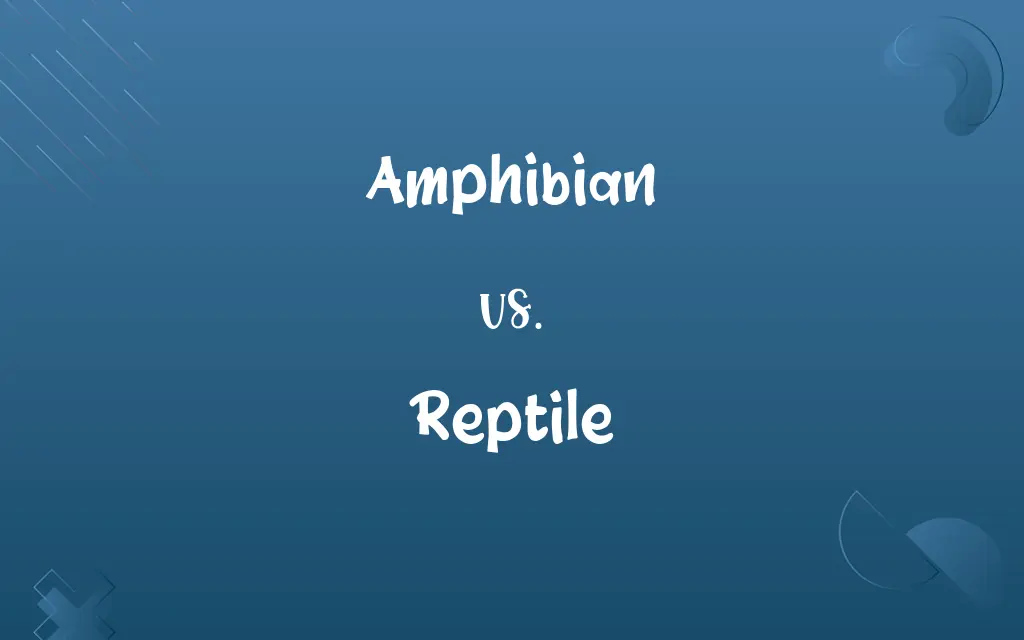Amphibian vs. Reptile: Know the Difference

By Shumaila Saeed || Updated on December 25, 2023
Amphibians are cold-blooded vertebrates that live both in water and on land, undergoing metamorphosis, while reptiles are cold-blooded vertebrates with scaly skin, living mainly on land.

Key Differences
Amphibians, like frogs, evolved from fish and are considered an evolutionary link to reptiles. Reptiles, including snakes and turtles, evolved from amphibians, adapting to life on land.
Shumaila Saeed
Nov 17, 2023
Amphibians have moist, permeable skin and usually go through a metamorphosis. Reptiles have dry, scaly skin and are born in their adult form.
Shumaila Saeed
Nov 17, 2023
Amphibians typically need water for breeding and start life in water before moving to land. Reptiles are more adapted to terrestrial life, with some aquatic exceptions.
Shumaila Saeed
Nov 17, 2023
Amphibians lay soft, jelly-like eggs, usually in water. Reptile eggs are harder, leathery or calcareous, and can be laid on land.
Shumaila Saeed
Nov 17, 2023
Both are ectothermic, but amphibians are more dependent on external water and humidity conditions, while reptiles can regulate body temperature more efficiently on land.
Shumaila Saeed
Nov 17, 2023
ADVERTISEMENT
Comparison Chart
ADVERTISEMENT
Amphibian and Reptile Definitions
Amphibian
An amphibian is a cold-blooded vertebrate that lives both in water and on land.
Frogs are amphibians, starting life as tadpoles in water.
Shumaila Saeed
Nov 16, 2023
Reptile
Reptiles lay eggs with tough, leathery shells on land.
Turtles, being reptiles, lay their eggs on the beach.
Shumaila Saeed
Nov 16, 2023
Amphibian
Amphibians have moist, permeable skin allowing for gas exchange.
Salamanders, as amphibians, can breathe through their skin.
Shumaila Saeed
Nov 16, 2023
Reptile
Reptiles are an integral part of global biodiversity and ecosystems.
The presence of reptiles like iguanas is crucial for maintaining ecological balance.
Shumaila Saeed
Nov 16, 2023
Amphibian
Amphibians are known for their dual life, starting in water and moving to land.
Newts are amphibians, spending time both in water and on land during their life cycle.
Shumaila Saeed
Nov 16, 2023
ADVERTISEMENT
Reptile
Reptiles are known for their well-developed lungs and terrestrial adaptations.
Lizards, as reptiles, are well-adapted to life in dry environments.
Shumaila Saeed
Nov 16, 2023
Amphibian
Amphibians are an essential part of both aquatic and terrestrial ecosystems.
Amphibians like tree frogs contribute to the balance of both forest and aquatic ecosystems.
Shumaila Saeed
Nov 16, 2023
Reptile
A reptile is a cold-blooded vertebrate with dry, scaly skin.
Snakes, as reptiles, have scales that cover their bodies.
Shumaila Saeed
Nov 16, 2023
Amphibian
Amphibians typically undergo metamorphosis from a larval stage to an adult.
The transformation of a tadpole into a frog is an example of amphibian metamorphosis.
Shumaila Saeed
Nov 16, 2023
Reptile
Reptiles include snakes, lizards, turtles, and crocodilians.
Crocodiles are reptiles adapted to both aquatic and terrestrial habitats.
Shumaila Saeed
Nov 16, 2023
Amphibian
Any of various cold-blooded, usually smooth-skinned vertebrates of the class Amphibia, characteristically hatching as an aquatic larva with gills and then transforming into an adult having air-breathing lungs. Frogs, toads, salamanders, and caecilians are amphibians.
Shumaila Saeed
Oct 19, 2023
Reptile
Any of various usually cold-blooded egg-laying vertebrates often grouped in the class Reptilia, having dry skin covered with scales or horny plates and breathing by means of lungs, and including the snakes, lizards, crocodilians, and turtles. In some classification systems, birds are considered to be reptiles because they are descended from reptilian dinosaurs.
Shumaila Saeed
Oct 19, 2023
Reptile
(strictly) A cold-blooded vertebrate of the class Reptilia; an amniote that is neither a synapsid nor a bird; excludes amphibians.
Shumaila Saeed
Oct 19, 2023
Amphibian
A tracked or wheeled vehicle that can operate both on land and in water.
Shumaila Saeed
Oct 19, 2023
Reptile
Creeping; moving on the belly, or by means of small and short legs.
Shumaila Saeed
Oct 19, 2023
Amphibian
An animal of the Amphibia; any four-legged vertebrate that does not have amniotic eggs, living both on land and in water.
Shumaila Saeed
Oct 19, 2023
Reptile
Creeping; moving on the belly, or by means of small and short legs.
Shumaila Saeed
Oct 19, 2023
Amphibian
A vehicle which can operate on land and water. See Wikipedia article on "Amphibious aircraft"
Shumaila Saeed
Oct 19, 2023
Reptile
Hence: Groveling; low; vulgar; as, a reptile race or crew; reptile vices.
There is also a false, reptile prudence, the result not of caution, but of fear.
And dislodge their reptile soulsFrom the bodies and forms of men.
Shumaila Saeed
Oct 19, 2023
Reptile
An animal that crawls, or moves on its belly, as snakes,, or by means of small, short legs, as lizards, and the like.
An inadvertent step may crush the snailThat crawls at evening in the public path;But he that has humanity, forewarned,Will tread aside, and let the reptile live.
Shumaila Saeed
Oct 19, 2023
Reptile
Any cold-blooded vertebrate of the class Reptilia including tortoises turtles snakes lizards alligators crocodiles and extinct forms
Shumaila Saeed
Oct 19, 2023
Amphibian
Cold-blooded vertebrate typically living on land but breeding in water; aquatic larvae undergo metamorphosis into adult form
Shumaila Saeed
Oct 19, 2023
Repeatedly Asked Queries
Can amphibians breathe underwater?
Some amphibians can breathe underwater through their skin or gills in their larval stage.
Shumaila Saeed
Nov 17, 2023
What classifies an animal as an amphibian?
Amphibians are classified by their life in both water and land, undergoing metamorphosis.
Shumaila Saeed
Nov 17, 2023
What is the primary habitat of reptiles?
Reptiles primarily inhabit terrestrial environments, though some are adapted to aquatic life.
Shumaila Saeed
Nov 17, 2023
How do reptiles reproduce?
Most reptiles reproduce by laying leathery or calcareous eggs on land.
Shumaila Saeed
Nov 17, 2023
What is metamorphosis in amphibians?
It's the process where amphibians transform from larval (water-based) to adult (land-based) forms.
Shumaila Saeed
Nov 17, 2023
Are all reptiles carnivorous?
No, while many are carnivorous, some reptiles are omnivorous or herbivorous.
Shumaila Saeed
Nov 17, 2023
Can amphibians survive solely in water?
No, most amphibians need both aquatic and terrestrial habitats at different life stages.
Shumaila Saeed
Nov 17, 2023
Are reptiles warm-blooded?
No, reptiles are ectothermic, meaning they are cold-blooded and rely on external sources to regulate body temperature.
Shumaila Saeed
Nov 17, 2023
Do amphibians have scales?
No, amphibians have moist, permeable skin without scales.
Shumaila Saeed
Nov 17, 2023
Why are amphibians important to the ecosystem?
Amphibians help control pests and are indicators of environmental health.
Shumaila Saeed
Nov 17, 2023
How do reptiles regulate their body temperature?
They bask in the sun or seek shade to regulate their body temperature.
Shumaila Saeed
Nov 17, 2023
What threats do amphibians face?
Habitat loss, pollution, climate change, and disease are major threats.
Shumaila Saeed
Nov 17, 2023
Do amphibians have teeth?
Some do, but they are generally used for gripping rather than chewing.
Shumaila Saeed
Nov 17, 2023
Do reptiles have good hearing?
Reptiles generally have less acute hearing compared to mammals.
Shumaila Saeed
Nov 17, 2023
Are amphibians found in deserts?
Rarely, as they require moist environments; however, some can survive in arid conditions.
Shumaila Saeed
Nov 17, 2023
What is the lifespan of reptiles?
It varies widely, from a few years in some lizards to over a century in some turtles.
Shumaila Saeed
Nov 17, 2023
Can reptiles live in cold climates?
Some reptiles can, but they are generally more common in warmer climates.
Shumaila Saeed
Nov 17, 2023
How do amphibians contribute to scientific research?
They are model organisms for studying development, genetics, and disease.
Shumaila Saeed
Nov 17, 2023
Are reptiles affected by environmental changes?
Yes, like all wildlife, reptiles are impacted by habitat destruction and climate change.
Shumaila Saeed
Nov 17, 2023
Do reptiles care for their young?
Most reptiles do not, but some species show parental care.
Shumaila Saeed
Nov 17, 2023
Share this page
Link for your blog / website
HTML
Link to share via messenger
About Author
Written by
Shumaila SaeedShumaila Saeed, an expert content creator with 6 years of experience, specializes in distilling complex topics into easily digestible comparisons, shining a light on the nuances that both inform and educate readers with clarity and accuracy.








































































